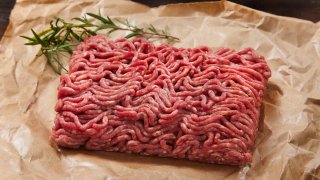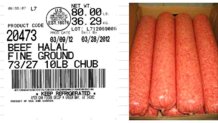
Over 58,000 pounds of ground beef products have been recalled due to possible E. coli contamination.
On Sept. 15, the U.S. Department of Agriculture shared the news in a bulletin on its website. According to the federal agency, the recall will affect approximately 58,281 pounds of ground beef products. American Foods Group, based in Wisconsin, discovered that a sample batch of beef tested positive for Shiga toxin-producing E. coli (STEC). The products were produced on Aug. 14, 2023, and sent to Georgia, Michigan and Ohio wholesalers.
American Foods Group, LLC — which does business as Green Bay Dressed Beef — did not respond to TODAY.com’s request for comment.
The USDA says there have been no confirmed reports of reactions related to the consumption of the products being recalled.
Get top local stories in DFW delivered to you every morning. Sign up for NBC DFW's News Headlines newsletter.
What products are being recalled?
Products that are being recalled have establishment numbers inside the USDA mark of inspection, which read “EST. 18076.”
The products being recalled come in the form of 10-pound plastic tubes or chub packs, typically used to pack meat materials like sausages and hamburgers.
The following products are subject to recall
- “90050 BEEF FINE GROUND 81/19” with lot code D123226026.
- “20473 BEEF HALAL FINE GROUND 73/27” with lot code D123226027.
- “20105 BEEF FINE GROUND 73/27” with lot code D123226027.

What to do if you have a product that was recalled
Recall Alert
The USDA instructs distributors and other customers who have purchased impacted products to throw them out or return them to vendors.
Consumers with questions can contact the American Foods Group LLC’s Vice President of Marketing and Communications at 1-800-829-2838 or email at info@americanfoodsgroup.com.
They can also call the USDA Meat and Poultry Hotline, which is toll-free at 888-MPHotline (888-674-6854) or email MPHotline@usda.gov for questions.
Roughly 3,000 Americans die annually from foodborne diseases, according to the CDC
The CDC approximates that foodborne disease cause illness in nearly 1 in 6 (48 million) Americans every year and that 3,000 die.
The public agency says E. coli (STEC) O157 causes an estimated 2,138 hospitalizations in the United States each year. It is included among the top five pathogens to cause hospitalizations in addition to Norovirus, salmonella, Campylobacter spp and Toxoplasma gondii.
What is Shiga toxin-producing E. coli?
According to the Centers for Disease Control, different strains of E. coli can cause disease by producing Shiga toxin, a biological poison. The bacteria that make Shiga toxins are called Shiga toxin-producing E. coli.
The CDC notes that seniors and very young children are more likely to develop severe illness from an STEC infection. On average, people who have consumed STECs can become sick for three to four days and as long as eight days. According to the USDA’s announcement regarding the Sept. 15 raw beef recall, people infected with STEC O103 will often experience vomiting and bloody diarrhea.
Who was the child that died from E. coli?
Riley Detwiler died from a particular strain of E. coli poisoning in February 1993 when he was 16 months old.
Riley contracted the bacteria while at his daycare after interacting with another child who had consumed hamburgers.
On the 30th anniversary of his death, his father, Darin Detwiler, penned an essay for TODAY.com detailing his fight to combat and raise awareness of foodborne disease.
What happens if you get E. coli in you?
According to the Cleveland Clinic, Escherichia coli (E. coli) typically exists in the intestines of people and animals and works to help digest food. However, things can get murky when different strains begin to produce toxins.
Different strains of E. coli can cause non-bloody and bloody diarrhea, vomiting and stomach aches and cramps, according to the Cleveland Clinic.
Is E. coli contagious?
E. coli is a highly contagious bacteria. According to the Mayo Clinic, E. coli can spread from person to person, especially when people fail to wash their hands. It can also spread from contaminated water and food.
Seniors, younger children and people with weakened immune systems have an increased chance of becoming ill after consuming the bacteria, the Mayo Clinic says.
This story first appeared on TODAY.com. More from TODAY:



